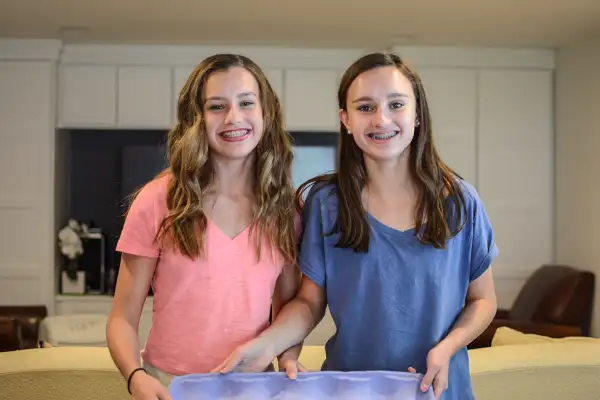How These Teenage Sisters Turned a $25 Science Experiment Into a Successful Company — All Before They Graduated High School

You never know when the perfect business idea is going to hit you.
For Caroline and Isabel Bercaw, it was when they were 10 and 11 years old. During the summer of 2011, their parents picked up $25 worth of ingredients to make homemade bath bombs as a science experiment. Little did their parents know that they were making a business investment that would turn into a multi-million dollar business.
Obsessed with the relaxing smells and vibrant colors of the bath bombs which bubble and fizz when dropped in hot water, Caroline and Isabel decided to make enough to sell at a local art fair near their home in Minneapolis. They borrowed around $350 from their mom, Kimberly, making sure to keep all receipts to pay her back. After three months of trial and error, they made about 150 bath bombs. When the art fair arrived, they sold their entire stock the first day.
That night they stayed up late to make as many more bath bombs as they could for the next day. But it wasn’t enough. They sold out of everything again. In those two days alone, Caroline and Isabel earned enough to pay their mom back and clear $350 in profits which they reinvested back into the business.
Today Kimberly and their dad, Benjamin, have quit their day jobs to run DaBomb Fizzers, a company that they say sells 500,000 bath bombs a month. Each bath bomb has a surprise inside such as charms or coins and can be found at stores such as Target and Ulta.
The company employs more than 100 people, the Bercaw family says, and generates multimillion-dollar revenues annually. The family declined to provide detailed figures however.
Benjamin handles the finances and operations while Kimberly manages marketing and branding. Caroline and Isabel, now 15 and 16, are co-chief creative officers: They create and test new bath bomb recipes, update the company’s social media, and act as the public faces of the company.
Isabel and Caroline are still in high school which means they often head to work after getting out of school at 1:45 pm. But even in-between classes, homework and track practice, they manage to answer emails and respond to social media comments.
“This was always about educating them more than they would learn at school,” says Kimberly. “It’s a wonderful opportunity for them to understand the steps of running a business.”
The sisters say they’re busy but happy, and even have plans to expand the business further.
Isabel and Caroline talked to Money about what it’s like to be a teen entrepreneur, and how they were able to grow their business so quickly.
How were you able to fund your business in the beginning?
Isabelle: “We started with literally $25 worth of ingredients. After the art fair, we paid our parents back and we reinvested in more ingredients. We saved our money, we were wise with it.”
How does running a business as siblings affect your relationship? Do you guys still argue and fight like other siblings?
Caroline: “We definitely fight, I’m not even going to try to cover that question up. We fight over the silliest things like clothing and bathroom time and stuff like that. But we get along really well in terms of business because we always have each others back. We are always looking out for each other and our strengths really complement each other.”
What did your parent’s house look like when you were first making bath bombs?
Isabelle: “It started in our basement. Then we moved into our living room and even on Thanksgiving we were packing bathbombs.
Caroline: “The turkey was going to have to wait.” (laughs)
Isabelle: “It was getting really crazy. We’d stay up late or we’d hear the tape gun when we were sleeping. That’s when we decided we needed to move into a warehouse. That was April 2016, one year after becoming an official business.”
Do your friends know about your business? What do they say?
Caroline: “If our friends find out, at first they will ask, “How much money do you make?” and then we’re like “OK, we pay ourselves, but we re-invest back into the company as well.”
Isabelle: “I try to stay a little more discreet about it because I don’t want people to think of me any differently. But I also want people to think “Hey, this is a casual thing. Maybe I can start a business, too.”
Caroline: Yeah and even my friends will tell me, “Hey I have this business idea, how does this sound?” they want me to give them pointers which is really cool.
What's in store for the future?
Caroline: “Something that we really want to do is expand our product line more and that’s in the works. Also to go international would be really great. We’ve gotten comments on Instagram of people saying, “Hey, I live in Australia but I can’t find your products.”
Isabelle: “Definitely want to go to college but no matter what I do in life I can take my entrepreneurial skills with me.”
